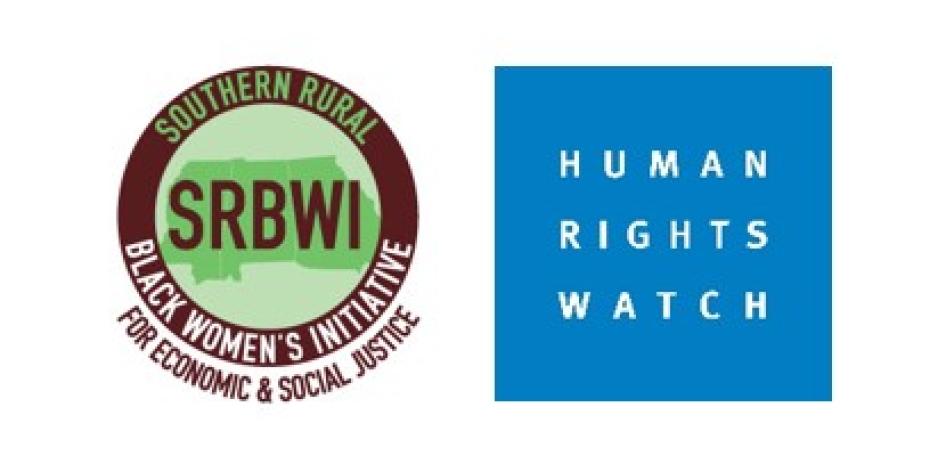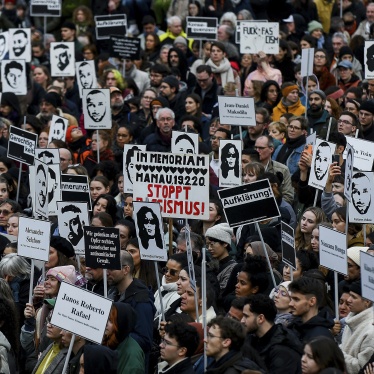Q and A on Participation
- What is the research?
This joint research project, led by the Southern Rural Black Women’s Initiative (SRBWI) and Human Rights Watch, will look at barriers Black women face in accessing reproductive healthcare services and information to prevent and treat cervical cancer. The project will also consider whether the Mississippi state and US federal governments have taken steps to fulfill their human rights obligations and ensure all women have access to the reproductive services, information, and tools they need to stay healthy and safe.
- If I participate in an interview, how long will it take?
The project is designed so that your participation in the interview should last an average of 45 minutes. However, given some of the questions are open-ended and you may have longer than average answers, the interview may take longer.
- Are there any risks for participation?
The subject matter of the research is related to your experiences accessing reproductive healthcare services and information. As this research collects information about your experiences, one of the risks is a possible loss of privacy or confidentiality associated with participating in this interview. To mitigate this risk, we will use pseudonyms (made-up names) if you would like. Community-based researchers will also receive ongoing training on protocols to ensure that your personal information remains confidential, private, and safe. We are happy to provide more information on these protocols if you would like. Information regarding our confidentiality and privacy protocols will also be included on the consent form you receive and sign prior to your interview.
Additionally, questions may relate to personal subjects and information that may cause discomfort, including your reproductive health history or challenges you have faced in trying to access health care when you really needed it. Some people may find certain questions or topics difficult to speak about. Interviewers will try to structure interviews to ensure that you feel supported and will provide information for resources in your community for follow-up support services if you need them. You can skip any question you do not want to answer for any reason, without explanation, or end the interview early if you wish.
- Do I have to participate?
Participation in the interview is completely voluntary. If you decide you do not want to participate, there will not be any consequence or penalty. Once you agree to start the interview, you can still change your mind and stop participating at any time or ask to skip questions you do not want to answer.
- What are the benefits to participating?
There are no financial benefits or incentives for participating in the research. SRBWI and HRW do not provide health or other direct services. The hope, however, is that the information you provide will allow us to expose barriers women in your community face in accessing reproductive health services so that we can push for change or for new programs and policies.
- Will I be paid to participate?
Participation is voluntary and there is no direct compensation for participating in the interview. However, we greatly appreciate your time and participation.
- How will my information be used and shared?
The research will be published in a joint publication by SRBWI and Human Rights Watch that will be posted on the internet. It will also be used in media outreach activities, on social media, in letters to government leaders, and in other written communications as well as public presentations. The research could also be featured in various media outlets on TV, the internet, print, and radio.
The information you provide will be protected. It will only be shared publicly in ways that ensure your identity remains confidential, unless you choose to be identified by your real name. With your permission, if we use your individual testimony in the report, we will use a pseudonym (a made-up name) for you. You may also choose to be identified by your real name and if your testimony is used in the report, we will use your first name and last initial. We normally also include your age and the town and country where you live. If you do not wish to be identified and have concerns that some of this information would be enough to identify you, we will withhold some or all these details if you request.
Your interview will take place in person with a community-based researcher. With your consent, this interview will be recorded using a voice recorder and transcribed. Any personally identifying data will be stored separately in a centralized and secure cloud storage system and authorized staff will be the only ones with access to this information. Authorized staff include the community-based researcher who you interview with, the project leads from SRBWI and Human Rights Watch, and the Human Rights Watch security team. Personally identifying data will be deleted once the research project is over.
- What if I have questions now or after the interview?
If you would like further information or if you have questions after you participate in the interview, you may contact: the primary lead from Human Rights Watch, Breya Johnson (johnsob@hrw.org; 646-761-5630), or the primary lead from SRBWI, Sarah Bobrow-Williams (Sarah.Bobrow@srbwi.org; 601-321-1966).









